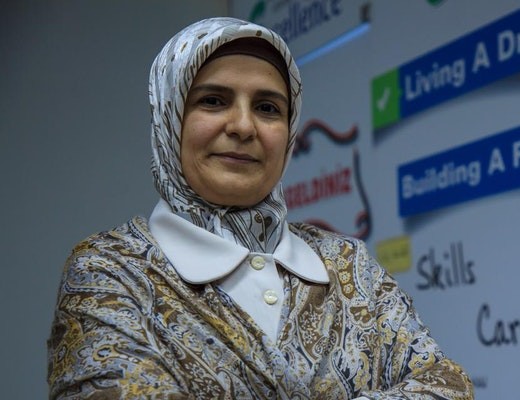
by the CIDP Team
Published: August 18, 2017
“In Turkey, as in the rest of the region, Syrians are starting businesses that are creating jobs, livelihoods, and independence for themselves and for other refugees. […] In addition to first-time refugee business owners, there are seasoned Syrian entrepreneurs who moved, along with their business expertise and capital, from Syria to other countries in the region, including Turkey. In the words of a Syrian business owner in Istanbul, “We are international businessmen. We have also been to Dubai and Riyadh. Syrians in Turkey are not just poor refugees.”
– Building Markets report, Another Side to the Story: A Market Assessment of Syrian SMEs in Turkey, 2017
The devastating scale of the humanitarian crisis in Syria has internally displaced more than six million people and forced five million more to flee across the border into neighbouring countries. The experiences of these refugees have often been reduced to a single narrative where newcomers are seen as burdens on their host communities. However, a closer look at the capabilities and contributions of Syrian-owned SMEs operating in Turkey reveals ‘another side to the story’.
Since the Syrian Civil War began in 2011, Turkey has welcomed more than three million refugees. This massive influx has put considerable strain on Turkey’s infrastructure, public services, and the availability of jobs and affordable housing. However, many Syrian entrepreneurs have also established small and medium-sized enterprises (SMEs), which help to offset the costs of the crisis. Syrian-led businesses have created new formal jobs in Turkey and stimulated the potential for growth, innovation, and enterprise for refugees and their host communities.
A recent market assessment funded by Global Affairs Canada and conducted by Building Markets found that Syrians have invested nearly $334 million into 6,033 new formal companies in Turkey since 2011. The typical Syrian-owned business in Turkey has been operating for 2.5 years and generates an average annual revenue of $463,201. On average, each business employs 9.4 individuals and over 50% of SMEs aim to hire in the next 12 months. In 2017, Syrians are expected to establish over 2,000 additional businesses in Turkey with approximately $90 million of Syrian capital.
Asmaa opened a language institute in #Turkey to help #Syrians learn the local language. She also offers courses in English & Arabic. 9/ pic.twitter.com/hwmjaeExC0
— Building Markets (@BuildingMrkets) June 20, 2017
On July 12, the Canadian International Development Platform (CIDP) hosted a panel discussion in partnership with Building Markets to delve further into the positive economic and social impact of Syrian SMEs on the Turkish economy. The discussion was moderated by Dr. Yiagadeesen (Teddy) Samy, Director of the Norman Paterson School of International Affairs (NPSIA) and Professor of International Affairs at Carleton University. CIDP was joined by five expert panellists:
- Jennifer P. Holt, CEO, Building Markets;
- Lawrence Peck, Deputy Director – Jordan and Syria (Development), Global Affairs Canada;
- Kavya Raman, Project Director, Building Markets; and
- Selen Ucak, Consultant, Building Markets.
Building Markets CEO, Jennifer P. Holt, summarized the benefits of delivering targeted support for Syrian SMEs in Turkey: “Syrian entrepreneurs are demonstrating that when given the opportunity, they can produce significant social and economic dividends for both refugees and their host communities.” Despite the advantages of starting a business in Turkey’s large and advanced economy, key aspects of the operating environment continue to limit the growth of Syrian-owned businesses. Lead author and researcher of the Building Markets study, Selen Ucak, cited language barriers and limited access to business support, new markets, investment capital, and procurement opportunities as primary challenges.
Osamah’s advice for budding #Syrian #entrepreneurs is build networks, know your market & don’t be afraid to seek support #withrefugees 12/ pic.twitter.com/epZjIO33lZ
— Building Markets (@BuildingMrkets) June 20, 2017
The following excerpt from the report, Another Side to the Story: A Market Assessment of Syrian SMEs in Turkey, provides recommendations to address these concerns and improve conditions for Syrian-owned businesses:
- “Ease regulatory burdens, improve the operating environment, and reduce uncertainties for Syrian SMEs in order to encourage formalization, boost exports and job creation, and enable Syrian entrepreneurs to deploy and retain their capital in Turkey.
- Promote integration of Syrian businesses in the Turkish economy by reducing language barriers and encouraging dialogue, mentorship, and partnership. Communicate Syrian SMEs’ success stories and contributions.
- Develop and offer business training that is aligned with Syrian SME growth constraints and offered in Arabic and Turkish.
- Facilitate relationships between Syrian SMEs and buyers by translating and making tenders easily accessible and developing inclusive procurement policies.
- Increase access to working capital and investment through access to better SME data, tailoring products to Syrian SME needs, and by attracting Syrian capital from the region through investment support activities.”
Canada’s support for initiatives targeting private sector growth in crisis-affected regions signals a commitment to building local resilience. The work of Building Markets provides a rare opportunity to position Syrian SMEs as partners that can help ensure the successful economic and social integration of Syrian refugees in Turkey. Further, as we look towards the post-conflict reconstruction of Syria, the report’s findings highlight the importance of strengthening Syrian SMEs as potential implementing partners of Canadian humanitarian assistance.
The full report, Another Side to the Story: A Market Assessment of Syrian SMEs in Turkey, is available at http://anothersidetothestory.org.
The Canadian International Development Platform (CIDP) leverages open data and big data to provide a comprehensive picture of Canada’s engagement with developing countries. CIDP is housed at the Norman Paterson School of International Affairs (NPSIA) at Carleton University, Ottawa.
Building Markets is a nonprofit organization that creates jobs and encourages economic growth in crisis-affected countries by connecting local SMEs to new business opportunities. Through its approach, the organization has profiled and built a network of more than 23,000 local SMEs, assisted those businesses in winning $1.3 billion in contracts, and helped create over 69,000 jobs.


Recent Comments